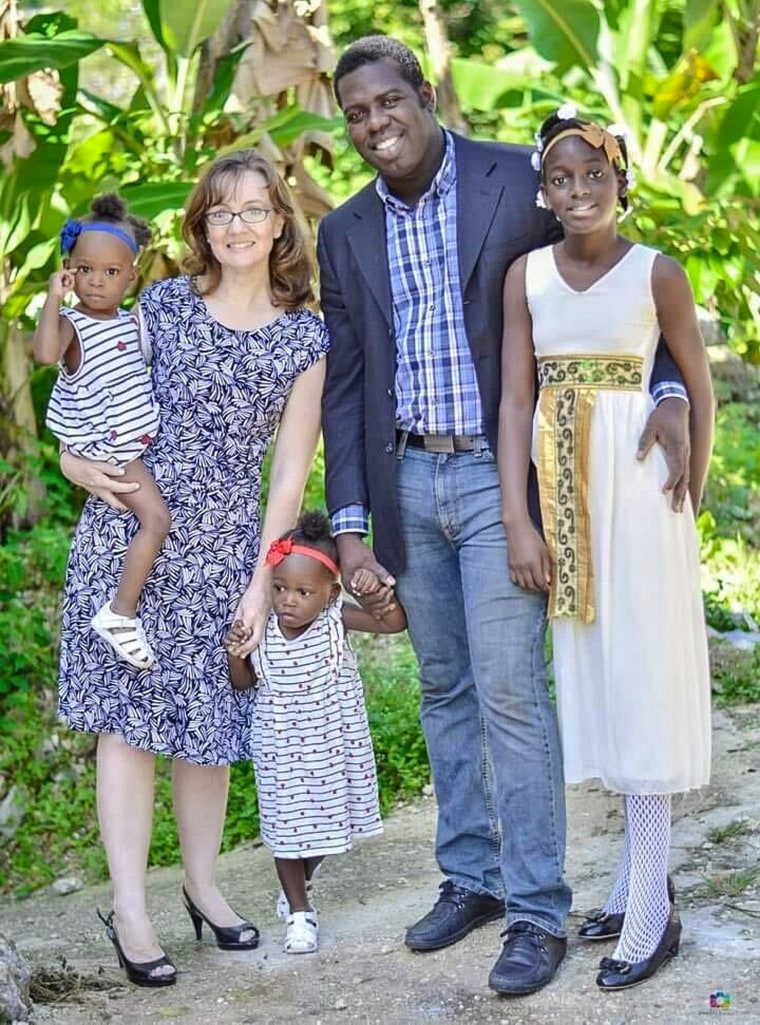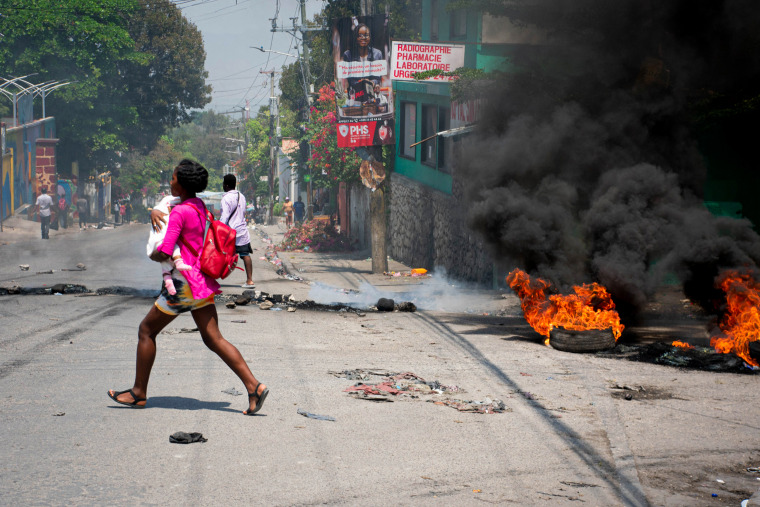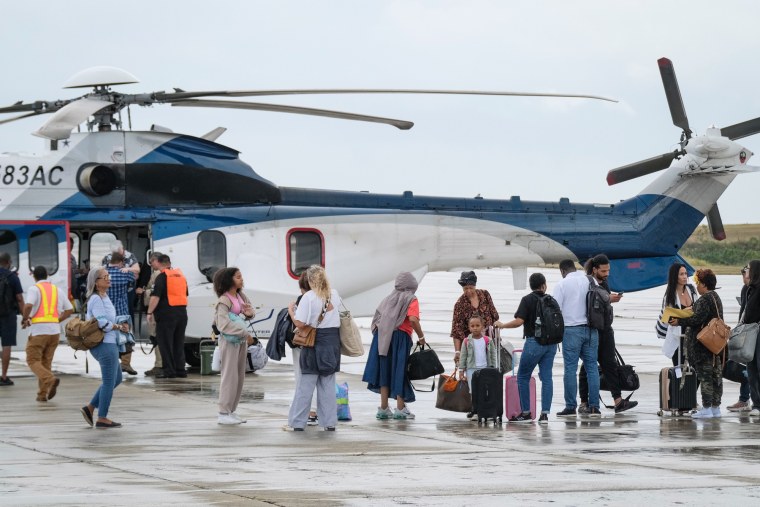At least 450 U.S. nationals have been evacuated from Haiti since last month, escaping the ongoing political turmoil and violence. But those who remain are now struggling to leave, and their relatives in the U.S. are desperate to see them return home.
The U.S. State Department is working to airlift more Americans out of Haiti, and Florida Gov. Ron DeSantis announced Tuesday that the state had rescued 220 Americans from Haiti since March 20.
While the evacuations have brought some comfort for those Americans able to flee, many who remain say hope of leaving is slipping away, and they’re scrambling as the chaos closes in around them. Erika Childs Charles, a 42-year-old mother of three who lives in Haiti, said she and her family had relocated several times since early March to avoid the rapidly increasing violence.
“They attacked the airport a couple of times, and then they were actively attacking two police stations close to our home,” Charles said. “The gunfire was right around us. We had to all sleep on the floor in one room of our home to stay away from any stray bullets.”
Charles said she and her husband, Moroni Charles, 38, and their three daughters, aged 14 and 6-year-old twins, moved from their Port-au-Prince home to South Haiti and back to the capital seeking safety over the last two years. She, her husband and their oldest daughter are able to enter America through her citizenship and their visas, Charles said. But they are still going through the lengthy process of adopting the twin girls, so there is no way to get them into the U.S.

“We’ve been trying to get them Haitian passports, but the immigration office has been closed for weeks. They don’t have a way to leave the country at this point,” Charles said, adding that they’ve sought help from the U.S. State Department, the American embassy and congressional leaders. “We just keep getting the same answer, that there’s not much they can do for us.”
Still, Charles says she is desperate to find a way.
“I’ve spent weeks trying to find ways that we could evacuate our whole family,” she said. “The problem I’m running into is I am the only American citizen in my family and so the U.S. embassy has had occasional helicopters to evacuate U.S. citizens, but I would have to go and leave my family behind. And that’s something I can’t do.”
Simmering tensions in Haiti boiled over in late February when a coalition of armed groups, which included paramilitary and former police officers, launched an attack against Prime Minister Ariel Henry’s government. They raided prisons, attacked hospitals, banks and more. Henry agreed to resign on March 12, contingent upon the formation of a transitional government.
Concerns for the safety of foreigners in Haiti have grown as the country descends further into lawlessness. The airport, in an area of Port-au-Prince where families like Charles’ once found safety, has been shut down by armed groups, further complicating evacuation efforts. The United States and Caricom, a regional trade bloc, have pledged to help form a transitional government in the country, but that plan has yet to materialize. For now, armed groups once aligned with corrupt politicians control at least 80% of Haiti’s capital, according to a United Nations estimate.
As of the end of March, at least 1,600 Americans had filled out the State Department’s crisis intake form for help fleeing the country. In response to the growing urgency of the requests, the State Department began chartering private helicopters last month to help evacuate Americans from Port-au-Prince into neighboring Dominican Republic. However, the citizens must make their own way home after reaching the Dominican Republic and reimburse the U.S. government for their flights out of Haiti.
Michèle-Jessica Fièvre, known as M.J., was born and raised in Haiti and now lives in Florida. She anxiously awaits word from her 12 relatives, from young children to the elderly, who live in Port-au-Prince and Pétion-Ville, a hilly suburb of the capital.
“Every day, we wake up to reports of more violence, vandalism, looting and the tragic destruction of homes, shops and essential public services,” Fièvre told NBC News. “No place seems safe; from police stations to schools, churches, and even the National Library, every location is a potential target.”

Two of her relatives are American citizens, but they refuse to leave their native family members behind, she said. Her family is in a “wait and see” situation, Fièvre said, wondering if they’ll be able, both physically and financially, to flee the violence. She said helicopter rides out of Port-au-Prince are costly and risk being attacked by armed groups. Those who hope to evacuate fear what will happen when they journey from their homes.
“Even those with potential routes out are paralyzed by the enormity of the task. Moreover, the psychological impact of uprooting one’s life under such dire circumstances cannot be overstated,” Fièvre said. “Some of my family members are trapped with no access to resources, visas or passports; the feeling of helplessness grows. They are unable to leave a neighborhood that has become a hotbed of danger, witnessing atrocities and living in constant fear for their lives.”
While some are coordinating costly private helicopters out of Port-au-Prince, nongovernment organizations are coordinating rescues, too. Project Dynamo, an international search-and-rescue nonprofit group, said it has received more than 100 pleas for help from Americans in Haiti since it began operations there in March. By the end of that month, Project Dynamo had rescued 53 people, from toddlers to the elderly, from Port-au-Prince by helicopter.
“This was an incredibly complicated and long operation — with many hurdles, hazards, and dangers,” Project Dynamo Bryan Stern said in a press release. According to the release, veterans endured gunfire and small fires as they made two trips to a dusty soccer field to rescue people by helicopter. “However, once again, we were able to answer the call and rescue dozens of Americans who were trying to survive an unimaginable situation.”
Armed groups ramped up their violence after Henry repeatedly failed to hold elections and announced last year that elections would be postponed again, to 2025. The groups are behind the escalation of murders, rapes, and kidnappings since the assassination of the democratically elected President Jovenel Moïse in 2021, according to the Uppsala Conflict Data Program at Uppsala University in Sweden.
According to a report from the U.N. in January, more than 8,400 Haitian people were killed, injured or kidnapped in 2023, an increase of 122% from 2022. The current crisis is unfolding as Haiti is still recovering from the devastating earthquake in 2010 that killed about 220,000 people, and another deadly earthquake in 2021.
John and Missy Tennant, of Greenfield, Indiana, have been working for years to bring their adopted sons, ages 13 and 15, from Haiti to be with them in the U.S. The adoption process was lengthy, and the turmoil in Haiti has further complicated their efforts. With the adoption finalized, the couple is hoping the State Department will expedite or waive the passports and visas necessary for them to bring the children to their new home.
When they speak to their sons on the phone, the Tennants said, the teens sound upbeat, but their fear is evident.
They’ve “told us of situations where they hear gunfire and they’re hiding under their bed,” Missy said. “Moms and dads are supposed to be able to protect their kids and make things better, and we can’t really do that. We’re doing everything that we can with where we’re at right now, raising the alarm. Begging, screaming at the top of our lungs, just saying, ‘please help us get our children out of this deadly situation!’
“This is now a situation of life or death. That’s the way it is.”
For more from NBC BLK, sign up for our weekly newsletter.

